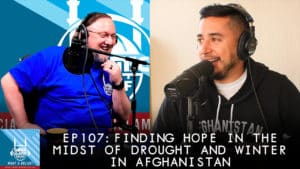 In this week’s “What a Relief!” podcast episode, host B.C. Dodge sits down with Ali Baluch, an accomplished filmmaker and a producer for MTV. Baluch accompanied Islamic Relief USA on a trip to Afghanistan in November 2018.
In this week’s “What a Relief!” podcast episode, host B.C. Dodge sits down with Ali Baluch, an accomplished filmmaker and a producer for MTV. Baluch accompanied Islamic Relief USA on a trip to Afghanistan in November 2018.
What Afghanistan is Facing Today
This winter, Afghanistan has been in the midst of a severe drought, devastating the livelihoods of many in rural areas who rely on better climate and weather to fuel their agricultural income.
Being a country with diversified geographical makeup, the drought noticeably looks very different, depending on which region people are living in. In rural areas, many rely on livestock and farming for income and food security. In mountain regions specifically, the snow that normally melts is used as water for livestock and to grow food. Since the water is no longer there to sustain these families, they are now forcibly displaced in their own country.
As Ali Baluch illustrates at the start of this podcast, things have taken a very dark turn, and climate change is to blame.
An Introspective Look at Displacement Camps
Baluch’s trip with IRUSA started in one of the rural parts of Afghanistan, where the team went and visited families in displacement camps. The camps consist of makeshift tents made of flimsy material that does little to protect against dropping temperatures and increased dirt, pollution, and dust from the desert.
The camps are far away from big cities, which are now overcrowded as a result of the drought, since many who previously relied on their previous agricultural employment are now forced to go to seek employment in urban areas.
The tents, which can comfortably fit two people, are holding families of five and six, and have no electricity and very limited privacy. Baluch noticed that many of the families try to maintain a sense of normalcy, even finding that many of the women would gather and socialize.
He relates the cold weather to his time spent at film school in Chicago. Although temperatures were incredibly cold, he would have to endure it for only several minutes until finding himself back in the comfort of indoor heating. The families in Afghanistan living in these camps do not have that luxury.
B.C. Dodge points out a common misconception about the overall region, saying, “I don’t think people understand that in the Middle East and in the subcontinent area, it gets cold.”
Hope Shines In
Baluch credits IRUSA and the resilience of those served as rays of hope. He emphasized that IRUSA and the global Islamic Relief family were able to find these disenfranchised villages located in the middle of nowhere and provide emergency resources in the form of food, warm clothes, blankets, tents, and medical care.
In addition, IRUSA has much-needed empowerment and educational projects that serve women and the most vulnerable. Another inspiring element of IRUSA’s humanitarian response is how much they know their way around the region, and how much emphasis they place on listening to the people, making it possible to truly address their needs. Baluch emphasizes, “Sometimes people just want to be heard.”
It is ultimately through the resilience of the people that hope comes in.
**And now you can reach out to us at our new email address: [email protected]!**
“What a Relief!” is the official podcast of Islamic Relief USA. Hosted by digital media specialist B.C. Dodge, IRUSA’s “What a Relief!” puts a human face on what’s going on in the world and how you can enact positive change in it. New episodes every week!
LISTEN. SHARE. REPEAT.